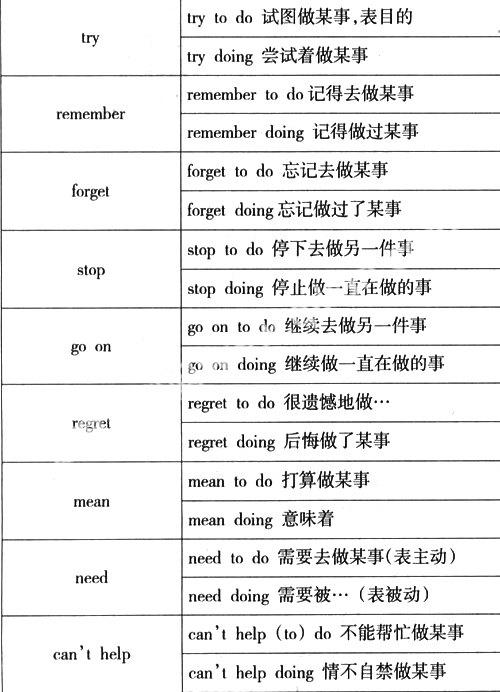动名词考点面面观
滕华敬
动名词在高考中考查的比例是比较大的。下面介绍一下动名词在高考中是怎样被考查的,考什么,怎么考,考多少等方面。现在我们按照考试频率由高到低的顺序总结一下:
考点1.:动名词作及物动词的宾语
请看2006,2007,2008三年的高考题对这一考点的考查,思考一下如何备考这类试题吧。
(1) I cant stand ______ with Jane in the same office. She just refuses _______ talking while she works. (2006北京卷)
A. working ; stoppingB. to work ; stoppingC. working ; to stop D. to work ; to stop
(2)The parents suggested ___ in the hotel room but their kids were anxious to camp out during the trip. (2006上海春)
A. sleepB. to sleepC. sleeping D. having slept
(3)--- There is a story here in the paper about a 110-year-old man.
--- My goodness! I cant imagine _________ that old. (2006江苏卷)
A. to be B. to have been C. beingD. having been
(4) —Can I smoke here?
—Sorry. We dont allow ______ here.(江苏卷)
A. people smoking B. people smokeC. to smoke D. smoking
(5)All the staff in our company are consideringto the city centre for the fashion show. (2007上海卷)
A.to go B.going C.to have gone D.having gone
(6) As a new driver, I have to practise _________ the car in my small garage again and again. (2008上海春招)
A. parking B. to parkC. parkedD. park
同学们会发现一些规律,备考策略就是汇总常见的只能跟 doing作宾语的动词。
常见的此类动词有:advise, allow, permit, avoid, consider, enjoy, finish, give up, cannot help, imagine, include, keep, keep on, mind, miss, put off, delay, practise, resist, suggest, dislike,admit,acknowledge ,appreciate,escape,deny,postpone,risk,fancy,excuse,stand,bear…等。
考点2:对于一些既可以用doing 作宾语又可以用 to do 作宾语的动词的考查。
这类试题在很多地方的高考题中备受青睐,不信请看下面的高考题。
(1)After he became conscious,he remembered ____ and _____ on the head with a rod.(江西卷)
A.to attack; hitB.to be attacked;to be hit
C. attacking;be hit D.having been attacked;hit
(2) —Robert is indeed a wise man.
—Oh, yes. How often I have regretted ______ his advice! (2007安徽卷)
A. to take B. takingC. not to take D. not taking
(3)Susan wanted to be independent of her parents. She tried ____alone, but she didnt like it and moved back home. (2008湖南卷)
A. livingB. to live C. to be living D. having lived
这些题你都能作对吗?如果没有,那么请掌握好下边这些词汇的重要用法吧。

看完这个表,以后做这类题应该胸有成竹了吧。
考点3. 动名词作介词的宾语
一般来讲介词后要跟名词或动名词作宾语,所以这类试题很好辨认,较为简单,可是很多题却是陷阱重重,危机四伏,一不小心就会失手的,不信试试下面这个题:
(1) You can't imagine what difficulty we had ______ home in the snowstorm.
A. walked B. walkC. to walk D. walking[2007 辽宁卷]
你看懂是怎么回事了吗?这个题没有介词啊?事实上,有介词,但是省略了。本题考查了短语 have difficulty in doing sth, (在做某事方面有困难),in省略了,所以本质上是考查in的宾语,毫无疑问应选D项。问题是如果你没有发现介词的省略,恐怕就只能猜题了。
如何备考呢,介绍两大陷阱题型以供参考:
陷阱一:介词的省略
在下列的句子结构中,介词常常被省略掉:
have trouble i/difficulty in doing sth在做某事方面有困难
spend time(money) (in) 花时间(钱)(干某事),
there is no point (in)(干某事)毫无意义
waste time (in) 浪费时间(干某事)
have no difficulty (in) (干某事)没有困难
have fun (in) (干某事)有趣
have (no)trouble (in) (干某事)有(没有)困难
end up (by) (以干某事)告终
take turns (at) 轮流 (干某事)
bother (about)(因干某事)烦恼
have a hard time (in)(因干某事)吃苦
陷阱二:to 作介词
请看下题:
(2) Isn't it time you got down to _______ the papers? (重庆卷)
A. mark B. be markedC. being marked D. marking
按照惯例,to后跟do,构成不定式,因此误选A。但是本题中的to却是介词,正确答案是D。
要知道大多数的to都是不定式符号,只有在少数短语中才是介词,因此只要熟知这些短语,一切也将迎刃而解。
如:
Look forward to 期待着 contribute to 促成,对…做贡献 lead to 导致,通向 be addicted to 对…成瘾,沉溺与 be accustomed to 习惯于devote to致力于get used to 习惯于 according to根据 get down to开始着手做.set about to开始做have access to有机会做
考点4 动名词的复合结构
动名词的复合结构是比较难理解的。首先从定义上来讲,动名词的复合结构就是在doing的前面加上一个逻辑主语;从应用的角度来看,主要适用于动名词作主语和宾语;从形式上来看分两种情况。第一种情况是当动名词作主语时,常可以在前面加上一个名词或代词的所有格,构成动名词的复合结构。例如:
Their coming to help was a great encouragement to us. 他们前来帮助我们对我们是极大的鼓舞。
. Tom's escaping from the prison made trouble for the jailer. 汤姆越狱逃跑给监狱看守带来了很多麻烦。
第二种情况是动名词在句中作宾语时,则既可以在前面加上一个名词或代词的所有格也可以加上名词或代词的宾格形式,例如:
Do you mind my smoking in the room? (逻辑主语my, 动名词smoking) 你介意我在房间里吸烟吗:
He insisted on Mary's staying there.(逻辑主语Mary, 动名词staying) 他坚持让玛丽留在那儿。
如果你看懂了,那么试做下面的高考题吧。
(1) At the beginning of class, the noise of desks___ could be heard outside the classroom.(2007全国高考II)
A. opened and closed B. to be opened and closed
C. being opened and closedD. to open and close
(2) It is difficult to imagine his ________ the decision without any consideration.
A. accept B. acceptingC. to acceptD. accepted
考点5;动名词作形容词的宾语
这类题的基本形式就是 be+ adj.+doing,有此用法的短语并不多,所以同学们平时要多积累。
举两个例子吧: be worth doing 和be busy doing.。请看下题:
(1)It is worth considering what makes “convenience” foods so popular, and ____ better ones of your own. (2008北京卷)
A. introduces B. to introduce C. introducingD. introduced
补充考点:动名词的主动形式表被动意义。
最常考的几个词有:be worth doing(值得被做);need doing(需要被做);want doing(需要被做);require doing(需要被做)。
关于动名词同学们已经了解了不少,但是记住一点:懂了不一定就必定能得分,因为你们必须在理解的基础上把它们记住,才算是真正变成自己的知识储备,才能得心应手,那么还等什么,开始行动吧。(文中试题的答案已用斜体在题上表注)
答案
考点1:动名词作及物动词的宾语
1——6 CCCDBA
考点2:对于一些既可以用doing 作宾语又可以用 to do 作宾语的动词的考查。
1——3 DDA
考点3. 动名词作介词的宾语
1——2 DD
考点4 动名词的复合结构
1——2CB
考点5;动名词作形容词的宾语
1. C

